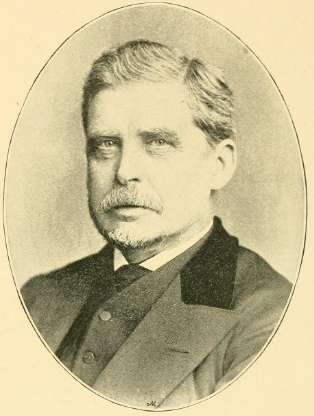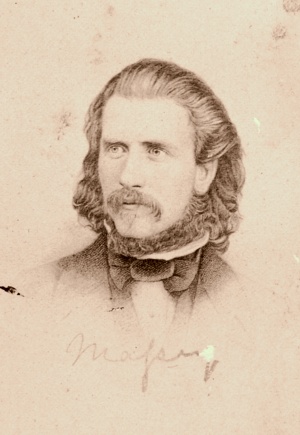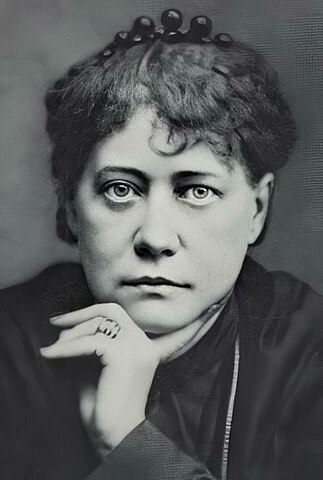関連ネタ>スピリチュアリズム
スピリチュアリストたちは19世紀後半から20世紀初頭に、進化理論の不確実性に反応した。広く言えば、進化の概念は人類の進歩的発展というスピリチュアリストの考えに合っていた。
スピリチュアリストの見方では進化は死で終わるものではなかった。スピリチュアリストたちは、死後に新たな存在世界で、魂はスピリチュアル状態に発達すると教えていた。スピリチュアリストたちは、魂の世界では、地球よりも高速に、成長しやすい条件の下で進化が起きる。
London Spiritualist Allianceの講演で、John Page Hopps師 (1834–1911) は進化とスピリチュアリズムの両方を支持した。Hoppsは、人類が動物の闇から不完全な状態でスタートし、天使の驚くべき光へと上昇すると主張した。Hoppsは、人類が堕落した動物ではなく、上昇した動物であり、死後に複数の存在世界を経て完全へと進化すると主張した
しかし同時に、人類が動物起源だという考えは、魂の不死性の基礎を脅かすものだった。というのは、人類が神に創造されたものでないなら、人類が特別な魂を持っているとは到底考えられないからである。しかし、大多数のスピリチュアリストたちは、そこまで考えることはなかった。
スピリチュアリストGerald Masseyはダーウィンの理論は不完全であり、それを補完するのはスピリチュアル進化だと主張した:
ブラヴァツキーの進化論の見方も、これと違ってはいなかった。
スピリチュアル反進化論
スピリチュアリストたちは19世紀後半から20世紀初頭に、進化理論の不確実性に反応した。広く言えば、進化の概念は人類の進歩的発展というスピリチュアリストの考えに合っていた。
スピリチュアリストの見方では進化は死で終わるものではなかった。スピリチュアリストたちは、死後に新たな存在世界で、魂はスピリチュアル状態に発達すると教えていた。スピリチュアリストたちは、魂の世界では、地球よりも高速に、成長しやすい条件の下で進化が起きる。
London Spiritualist Allianceの講演で、John Page Hopps師 (1834–1911) は進化とスピリチュアリズムの両方を支持した。Hoppsは、人類が動物の闇から不完全な状態でスタートし、天使の驚くべき光へと上昇すると主張した。Hoppsは、人類が堕落した動物ではなく、上昇した動物であり、死後に複数の存在世界を経て完全へと進化すると主張した
The great majority of British spiritualists harbored no unsettling doubts about the implications of evolution. They eagerly embraced the idea of organic change, finding that Darwin served to confirm their own scenario of progressive development beyond the veil. "I for one accept the truth of Mr. Darwin's theory of man's origin," wrote Gerald Massey in 1871,
イギリスのスピリチュアリストの大多数は、進化の影響について不安な疑念を抱いていなかった。彼らは器質性変化という考えを熱心に受け入れ、ダーウィンがヴェールを超えた進歩的な発展の彼ら自身のシナリオを確認するのに役立つことに気づいた。 「私はダーウィンの人類起源説の真実を受け入れる」とジェラルド・マッセイは1871年に書いている。
and believe that we have ascended physically from those lower forms of creation . . . But the theory contains only onehalf the explanation of man's origins, and needs Spiritualism to carry it through and complete it . . . Mr. Darwin's theory does not in the least militate against ours — we think it necessitates it; he simply does not deal with our side of the subject.
そして、我々はそれらの下位の創造形態か物質的に上昇したと信じている。... しかし、この理論には人間の起源の説明の半分しか含まれておらず、それを実行して完成させるにはスピリチュアリズムが必要である。...ダーウィンの理論は、我々の理論に対して少しも対抗するものではない。我々は、ダーウィンの理論がそれを必要としていると考えている。彼は単に我々の側の主題を扱わないだけである。
The spiritualists' side of the subject did not emphasize whence humanity had come, but looked instead whither it was going — to "progressive spiritual states in new spheres of existence" after physical death. There the perfection that fell to no individual in this world was the attainable reward of all upwardstriving souls, for evolution in the spirit world proceeded "at a rate more rapid and under conditions more favourable to growth" than those encountered on earth. It gave spiritualists no small pleasure to illustrate how evolutionary theory gave the lie to repressive beliefs concerning man's fall from grace. In 1888, for example, in a talk to the London Spiritualist Alliance, Reverend J. Page Hopps defined evolution as
この問題に関するスピリチュアリスト側は、人類がどこから来たのかを強調せず、代わりに人類がどこへ行くのか、つまり肉体の死後の「新たな存在領域における進歩的な精神状態」に目を向けた。そこでは、この世界の誰にも及ばない完璧さは、上向きに努力するすべての魂が達成できる報酬だった。なぜなら、霊界での進化は、地上で遭遇するものよりも「より急速な速度で、より成長に有利な条件で」進行したからである。進化論がいかに「人間の恵みからの転落に関する抑圧的な信念」の虚偽を証明したかを説明することは、スピリチュアリストにとって少なからぬ喜びとなった。たとえば、1888年、ロンドン・スピリチュアリスト・アライアンスでの講演の中で、J・ペイジ・ホップス牧師は進化を次のように定義した。
a persistence of some tendency which has, gently but irresistibly, forced all things upward into higher forms of life. Man did not begin perfect, and end in a 'fair; he began imperfect, and is steadily going on in the onward and upward path, out of the animal's darkness into the angel's marvellous light. He is not a fallen but a rising creature.
進化は、穏やかに、しかし抗いがたいほどに、万物をより高次の生命形態へと押し上げる、ある傾向の持続である。人間は完璧に始まり、「公平」で終わるわけではない。 人間は不完全な状態で始まったが、動物の暗闇から天使の素晴らしい光へと、前に向かって上向きの道を着実に進んでいる。彼は堕落した生物ではなく、立ち上がった生物である。
In an earlier work, Hopps had already announced that "the law of evolution" foreshadowed the spiritualists' afterlife. "That life, properly understood," he explained, "is only another step in the wonderful development of man's being: it is evolution still, but evolution into and in the sphere of mind."
ホップスは以前の著作で、「進化の法則」がスピリチュアリストの死後の世界を予見しているとすでに発表していた。 「その人生は、正しく理解されれば、人間という存在の素晴らしい発展のもう一つのステップにすぎない。それはまだ進化だが、心の領域への、そして心の領域内での進化である」と彼は説明した。
[ Janet Oppenheim: "The Other World: Spiritualism and Psychical Research in England, 1850-1914", Cambridge University Press, 1978, p.270]
しかし同時に、人類が動物起源だという考えは、魂の不死性の基礎を脅かすものだった。というのは、人類が神に創造されたものでないなら、人類が特別な魂を持っているとは到底考えられないからである。しかし、大多数のスピリチュアリストたちは、そこまで考えることはなかった。
Yet there were severe obstacles for spiritualists and psychical researchers who closely investigated the workings of evolution. It was a simple matter for someone like Hopps, or Gerald Massey, to proclaim the utter compatibility of Darwinian and spiritualist theories concerning human development before and after death. Their knowledge of biology was extremely limited; they were in no position, nor had they any inclination, to evaluate critically what they read about evolution in popular treatments of the subject. It was far more difficult for Alfred Russel Wallace, who worked out the theory of natural selection at the same time as Darwin and who well understood its implications for human history. Wallace realized that, if natural selection alone could account for man's place in nature, then the human species, like all others, had evolved from some earlier organism. If man had evolved from some earlier, prehuman organism, he was not qualitatively different from other, higher denizens of the animal kingdom. The human brain was merely more developed than theirs, having undergone further changes that rendered it capable of intellectual endeavor. If there was nothing basically distinctive about the human brain, apart from this further development, then there existed nothing characteristic of humanity alone among all other creatures — neither mind, nor consciousness, nor spirit. Wallace indeed knew that, far from supporting the spiritualist vision of eternal progress in the hereafter, "Mr. Darwin's theory" could be seen to undermine the most basic tenets of spiritualism. Although it is true that some spiritualists embraced the Eastern belief in transmigration of souls and assumed that other animals, besides man, possessed an eternal spirit, they were only a small portion of the British spiritualist population. The great majority continued to be influenced by the Christian conviction that the human race occupied a unique place in nature.
しかし、進化の仕組みを詳しく調査するスピリチュアリストや心霊研究者にとっては、大きな障害があった。ホップスやジェラルド・マッセイのような人にとって、死の前後における人間の発達に関するダーウィン理論とスピリチュアリスト理論の完全な互換性を宣言することは簡単なことだった。彼らの生物学に関する知識は非常に限られていた。彼らは、この主題の一般的な扱いにおける進化について読んだことを批判的に評価する立場になく、またその傾向もなかった。ダーウィンと同時に自然選択理論を考案し、それが人類の歴史に与える影響をよく理解していたアルフレッド・ラッセル・ウォレスにとって、それははるかに困難だった。ウォレスは、もし自然選択だけで自然界における人間の地位を説明できるのであれば、人間という種も他の種と同様に、初期の生物から進化したことになることに気づいた。もし人間が、より初期の人類以前の生物から進化したのであれば、人間は動物界の他の高等住人と質的に異なるものではない。人間の脳は単に彼らの脳よりも発達しており、知的努力ができるようにするさらなる変化を経ているだけである。もし、この更なる発展を除けば、人間の脳に基本的に特徴的なものが何もなかったとしたら、他のすべての生き物の中で人類だけが特徴的なものは何も存在しなかったということになる。心も意識も精神も。ウォレスは確かに、「ダーウィンの理論」は、来世における永遠の進歩というスピリチュアリズムのビジョンを支持するどころか、スピリチュアリズムの最も基本的な教義を損なうとみなされる可能性があることを知っていた。一部のスピリチュアリストが魂の輪廻についての東洋の信仰を受け入れ、人間以外の他の動物も永遠の精神を持っていると想定していたのは事実だが、彼らはイギリスのスピリチュアリスト人口のほんの一部にすぎなかった。大多数は、人類が自然の中で独特の位置を占めているというキリスト教の信念の影響を受け続けた。
[ Janet Oppenheim: "The Other World: Spiritualism and Psychical Research in England, 1850-1914", Cambridge University Press, 1978, pp.270-271]
スピリチュアリストGerald Masseyはダーウィンの理論は不完全であり、それを補完するのはスピリチュアル進化だと主張した:
In 1871, Gerald Massey (1828-1907 not to be confused with C. C Massey) the workingclass Spiritualist and mythographer confirmed his agreement with Darwinism and in doing so evidenced an evolutionary expansion which Blavatsky would also incorporate relating to spiritual evolution:
1871年、労働者階級のスピリチュアリストで神話学者のジェラルド・マッセイ(1828-1907, C.C.Masseyとは別人)は、ダーウィニズム同意を確認し、それによりブラヴァツキーがスピリチュアル進化に関しても組み込むであろう進化の拡張を証明した。
I for one accept the truth of Mr. Darwin's theory of man's origin and believe that we have ascended physically from those lower forms of creation which we find lying around us like chips in the great workshop of Nature...But the theory contains only onehalf the explanation of man's origins, and needs Spiritualism to carry it through and complete it. For while this ascent on the physical side has been progressing through myriads of ages, the Divine descent has also been going on- man being spiritually an incarnation from the Divine as well as a human development from the animal creation. The cause of the development is spiritual. Mr. Darwin's theory does not in the least militate against ours- we think it necessitates it; he simply does not deal with our side of the subject.
私は、ダーウィンの人間の起源に関する理論の真実を受け入れ、自然の偉大な作業場でチップのように我々の周りに横たわっている低次の創造形態から我々が物質的に上昇したと信じている...しかし、理論には半分しか含まれていない。人間の起源の説明であり、それを遂行し完成させるにはスピリチュアリズムが必要である。なぜなら、この物質的な側面の上昇が無数の時代を通じて進行している一方で、神の降下も霊的には神からの化身であると同時に、動物の創造物からの人間の発展として人間にも進行しているからである。発達の原因はスピリチュアルなものである。ダーウィンの理論は、我々の理論に対して少しも対抗するものではない。我々は、ダーウィンの理論が我々の理論を必要としていると考えている。ダーウィンは単に我々の側の主題を扱わないだけだ。
[ Jeffrey D. Lavoie: "The Theosophical Society: The History of a Spiritualist Movement", Universal-Publishers, 2012, pp145-146 ]
ブラヴァツキーの進化論の見方も、これと違ってはいなかった。
Blavatsky's view of evolution would seem to align with Massey's view of Darwinian evolution. Blavatsky assimilated Darwin's concept of evolution into her own cosmological construction of the universe, but only up to a certain point as Nicholas Goodrick-Clarke noted:'
ブラヴァツキーの進化論の見方は、ダーウィンの進化論についてのマッシーの見方と一致しているようだ。ブラヴァツキーはダーウィンの進化の概念を彼女自身の宇宙論的構造に同化したが、それはニコラス・グッドリック=クラークが指摘したようにある時点までにすぎなかった:
Contrary to modern evolutionary theory, this doctrine posits the involution of man from 'higher and more spiritual natures.' A 'divine spark' has descended into matter, and once it has reached its densest material level, it begins its ascent back to its source. Blavatsky thus assimilates modern evolutionism into her scheme, but only as the return cycle, and moreover, she rephrases its biological imperative in spiritual terms: 'The human race must be finally physically spiritualized' (I, 296)
現代進化論とは反対に、このドクトリンは人間が「より高度でより霊的な性質」から組み込まれたと仮定している。 「神の火花」が物質に降下し、最も密度の高い物質レベルに達すると、その源に向かって上昇し始める。このようにブラヴァツキーは現代進化論を彼女の計画に同化させているが、それは回帰サイクルとしてのみであり、さらに彼女はその生物学的要請を精神的な言葉で言い換えている:「人類は最終的に物質的にスピリチュアライズされなければならない」(I、296)
Thus, Darwinian evolution was only sufficient to explain life in the material phase of evolution, but not in the larger, grander picture, of spiritual evolution that Blavatsky held within her cyclical view of time."' This same idea was evidenced in Blavatsky's later work The Secret Doctrine: 'As remarked in Isis Unveiled, Darwin's evolution began at the middle point, instead of commencing from man, as for everything else, from the universals!'" Both Massey and Blavatsky's conceptualization of evolution illustrated what in Theosophy was called the ascent/descent theory. This idea suggested that humanity had descended from spirit into matter and will one day ascend back into spirit.
したがって、ダーウィンの進化論は、進化の物質的段階における生命を説明するのに十分であり、ブラヴァツキーが周期的な時間観の中で保持していたスピリチュアル進化という、より大きく壮大な全体像では説明できなかった。これと同じ考えが、ブラヴァツキーの後の著作でも示され。『シークレットドクトリン:ベールに包まれたイシス』で述べられているように、ダーウィンの進化は、人間から始まるのではなく、他のすべてのものと同様に、普遍的なものから始まるのではなく、中間点から始まりまった。マッセイとブラヴァツキーの進化の概念化は、神智学でいわゆる 上昇/下降理論。 この考えは、人類が精神から物質に降下し、いつかスピリチュアルに戻るだろうということを示唆していた。
[ Jeffrey D. Lavoie: "The Theosophical Society: The History of a Spiritualist Movement", Universal-Publishers, 2012, p.146 ]
 John Page Hopps (1834–1911) |  Gerald Massey (1828-1907) |  Helena Petrovna Blavatsky (1831-1891) |
スピリチュアル反進化論


コメントをかく